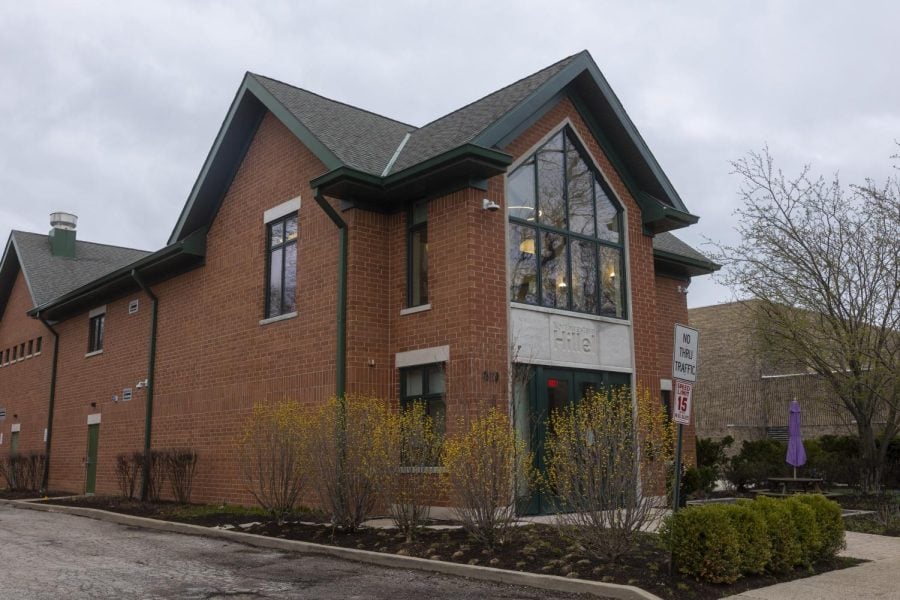Students participate in Passover seder traditions on campus and at home
Ava Mandoli/The Daily Northwestern
Hillel hosts dinners and services targeted towards Northwestern’s Jewish community throughout the school year. During the High Holidays, Hillel plays a pivotal role in supporting observing students.
April 18, 2022
For McCormick freshman Talia Ben-Naim, this was her first year celebrating Passover away from home. While she typically spends the holiday with family, this year she attended a seder on campus at Hillel with friends.
“I didn’t realize how used to my family’s seder I’d gotten,” Ben-Naim said. “We always host one every year, so it’s a lot of the same traditions … (this year I missed) helping out with the cooking, having all the dishes we would usually make.”
Seders are part of celebrating Passover, which started Friday evening and lasts seven or eight days, depending on denomination and location. Passover is a major Jewish holiday that recounts the Israelites’ exodus from Egypt, according to Michael Simon, Hillel’s executive director. During the seder, which means order, those who celebrate gather for a structured, ritualistic dinner to honor Jewish history and freedom.
“You retell the story of the Exodus, and there are songs and it’s a very, very important part of the Jewish tradition,” Simon said. “During Passover, going to a seder is a really big deal.”
Jewish student groups on campus planned a variety of activities for those who couldn’t return home for seders, SESP sophomore and Hillel Co-President Dalia Segal-Miller said.
Segal-Miller said Hillel created a Passover committee to assist with planning for the events. The committee hosted multiple seders during the first two nights of the holiday. The first night consisted of “more traditional” seders and the second night consisted of smaller, themed seders.
Passover is a family-oriented holiday, so Segal-Miller said fostering the same sense of community was difficult because each family celebrates in a different way. She said the committee worked to incorporate many different traditions into its events.
“In the smaller seders the second night, people had different songs that they sang that they taught us so that we could all sing them together,” Segal-Miller said. “I wasn’t with my family, but I was still able to learn about other people’s rituals and hear their stories of past Passovers from when they were a kid.”
The Passover committee also found students who wanted to lead specific seders, provided kosher food options to Jewish students and planned rituals that supported students from all ethno-religious subcultures.
On Friday night, Simon said more than 140 students attended the seder buffet. For students who wanted to host in the comfort of their own homes, Simon said Hillel provided celebration kits, which contained matzah boxes, grape juice and Haggadahs, books that tell the story of Passover and guide the seder.
“People just seem to be really interested in being safely back together again, and that’s very heartening,” Simon said. “It’s very meaningful for an organization that is about trying to build Jewish community on campus to be as welcoming and engaging as we can. This is what we’re here for.”
Other students decided to leave campus and spend the holiday with their loved ones. Weinberg junior Phoebe Chapnick-Sorokin went home Thursday and spent Friday helping her family cook and organize for their first night of Passover.
Chapnick-Sorokin said she decided to go home because she missed out on the Jewish High Holy Days — Rosh Hashanah and Yom Kippur — while studying abroad in fall. She said one of her favorite moments from this Passover was her dad’s Haggadah selection.
“My dad decided for our Haggadah this year, we were going to use a 1971 Haggadah out of the Lilith Magazine, which is a Jewish feminist magazine,” Chapnick-Sorokin said. “It was an egalitarian Haggadah, (it) didn’t mention God once. It was just really funny that we were reading this feminist text from 1971.”
It’s this familial element that makes Passover special for Chapnick-Sorokin, she said. While she used to get bored during the long rituals, she said she’s grown to appreciate them.
Ben-Naim said the holiday is a good time for her to stop, reflect and express appreciation for her freedom.
“(I try) to think about the value of helping those who are currently being oppressed, not just Jewish people but different groups across the world who might be facing a similar type of oppression,” Ben-Naim said. “That’s the focus of the Passover story.”
Caroline Brew contributed reporting.
Email: joannahou2025@u.northwestern.edu
Twitter: @joannah_11
Related Stories:
— ‘Darkness and hope and light’: Evanston, Chicago Jewish communities unite for Passover 2022
— Local Jewish organizations work to make keeping Passover more accessible
— Hillel supports students in quarantine with temporary Passover food options



